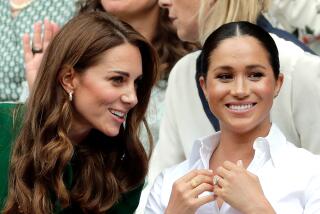Inquest of Diana’s death presses on
- Share via
LONDON — More than 10 years after the deaths of Britain’s “people’s princess” and her lover in a Paris car crash, the few who believe Princess Diana was deliberately killed continue to press their case in a coroner’s inquest now in its fifth month.
The inquiry, highlighted by a series of new details about Diana’s loves and the last minutes of her life, has riveted a nation that after a decade had seemingly sated itself on Diana headlines.
No details have been more awaited than last week’s testimony of Mohamed Fayed, the Harrods department store owner whose son died in the August 1997 crash. A still-mourning Fayed, speaking in court under oath, reiterated his accusations that the royal family plotted to kill his playboy son Dodi and the princess he said his son expected to marry.
“I am certain, 100%,” Fayed told a roomful of jurors and attorneys at the Royal Courts of Justice. “You have children. Put yourself in my position. What are you going to do? You are not going to rest. I am fighting unbelievable forces.”
Rest he has not. Fayed has spent the last decade pulling the purse strings of his own private investigation, claiming the couple was killed by a lengthening list of conspirators headed by Prince Philip, Duke of Edinburgh and husband to Queen Elizabeth II, with the aid of British and French secret services.
According to Fayed, the princess was pregnant with Dodi’s child and the pair were planning to announce their engagement the Monday after the fatal crash -- contradicting testimony from close friends of Diana who insisted that she had no intention of marrying him.
“They called me,” Fayed told the court, outlining a short conversation he claims to have had with Diana and Dodi just an hour before the accident in which they told him of their plans for marriage.
“She was happy,” he said. “She said, ‘I have good news for you. I am pregnant and Dodi will declare his engagement to me on Monday.’ ”
Branding Prince Philip a “Nazi” and a “racist,” Fayed said the crown would not allow Princess Diana to marry a Muslim man and give birth to his child.
“As a person who is a different religion, naturally tanned, curly hair, they will not accept that he will have anything to do with the future king,” he said, declaring that the royal father-in-law should be sent “back to Germany, from where he comes.”
“You want to have his original name?” Fayed asked the court. “It ends with ‘Frankenstein.’ ”
By the end of the questioning, Fayed and his lawyer, Michael Mansfield, had managed to finger a number of other conspirators, among them the British secret intelligence service, MI6, the French secret intelligence service, the CIA and U.S. National Security Agency, former Prime Minister Tony Blair “and his senior henchmen,” Princess Diana’s sister Sarah McCorquodale, Henri Paul, the driver of the crashed Mercedes, doctors, police officers, forensic specialists and two former heads of Scotland Yard.
It was only one of a number of unusual twists and turns in the inquest, including never-before-seen images of the final moments of Diana and Dodi at the Ritz before the crash, royal butler Paul Burrell’s supposed “secrets” turning out to be nothing more than hype and letters between the princess and Prince Philip, previously rumored to have been threatening and even cruel, revealed to be cordial and possibly even affectionate.
Fayed, who had waited a decade for his public forum, drew mainly snickers in the crowded courtroom.
“The French are not renowned for doing the bidding of the British, Mr. Al Fayed, are they?” a dubious Richard Horwell, lawyer for the Metropolitan Police, said in response to Fayed’s notion that the British and French could have collaborated on such a nefarious project.
The inquiry has been relentless in its search for previously little-known facts, a quest that so far has cost British taxpayers more than $4.5 million.
Personal correspondence between Diana and Prince Philip was brought to court. Detailed explanations of the princess’ contraceptive use were filed as evidence. The court even heard testimony from a close friend as to her last menstrual period, reported to have been only days before her holiday with Dodi, lodged in contradiction to Fayed’s claims that she was pregnant.
In testimony last week, former MI6 chief Richard Dearlove, who was the assistant chief at the time of the crash, firmly denied the accusation that Diana was killed by intelligence services.
“I would have known if there were assassination plans,” he said, testifying that there were no authorizations even to eavesdrop on the princess in 1997.
For some, finally, it has all become too much. In the last week, there have been calls from members of Parliament’s Intelligence and Security Committee for an end to the inquest.
“I think it’s a total waste of time and money. The extraordinary performance of Fayed has turned the whole thing into a circus,” former Labor Party minister Lord Foulkes told the Times of London, saying he believed the coroner should “seriously consider stopping the inquest.”
“We understand Mr. Fayed’s grief,” fellow lawmaker Dari Taylor told the paper. “But the fact is that he has got to accept at some stage that there was nobody involved in his son’s and Princess Diana’s death.”
The coroner, Lord Justice Scott Baker, appears determined in true British fashion to press on regardless.
“These inquests . . . will continue to be heard by the jury,” he said, “which in due course will return its verdict.”
More to Read
Sign up for Essential California
The most important California stories and recommendations in your inbox every morning.
You may occasionally receive promotional content from the Los Angeles Times.








